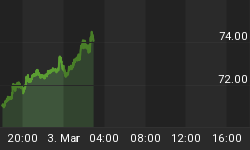The weakness of the world's economy is neither unusual nor necessarily very serious. Recessions, and a speedy recovery from them, are normal. The worry today is that the policy response is inadequate.
World demand has been supported by low savings in the US and the UK and rising budget deficits. Despite this, growth has slowed to well below its trend rate, as rising unemployment and falling capacity utilisation show. Profits rise when growth is above trend and fall when it's below. We should therefore expect profits to fall this year. Profits drive economies. As they fall, companies cut back on investment and employment. If disappointment hits the stock market and unemployment weakens house prices, then households will increase their savings rate and add to economic problems. Below trend growth thus leads to decline, unless reversed by a change in economic policy.
With excess capacity and falling profits, investment is highly unlikely to increase. If, as seems likely, household savings in America and Britain now rise, and there is no compensating fall elsewhere, then budget deficits must rise again. They can, however, rise either deliberately in order to prevent a recession, or accidentally because there is one.
The opposition to higher budget deficits has mounted in Europe, Japan and America. This is unfortunate, but not entirely unreasonable. Japan provides a worrying example of the apparent failure of fiscal policy. A decade of stagnation since 1992 has accompanied a swing in the budget balance from a surplus of 0.8% of GDP to a deficit of 8%.
This failure may have been caused by the offsetting impact on external trade. The yen has strengthened and the trade surplus fallen from $125 bn. in 1992 to $ 70 bn. in 2001. This reaction is forecast by several economic models. They show that, in the absence of additional monetary stimulus, rising budget deficits push up the real exchange rate.
Therefore Japan's fiscal policy has not been ineffective. It has just failed to benefit Japan. Demand in the rest of the world has been aided by the fall in Japan's external trade surplus. We are left with a paradox, which may have been accentuated by globalisation. Rising fiscal deficits are just what the world needs, but they are a disinterested kindness, done for the benefit of others.
It is unlikely that America, Europe and Japan can be persuaded to increase budget deficits for their mutual benefit. It is more likely that the "Stupidity and Gloom Pact" will act to offset the small stimulus from tax cuts that President Bush is proposing; though the unselfish nature of his actions may have escaped his notice.
Monetary policy is thus the only way that world demand is likely to be boosted. Economic forecasting is so uncertain that it may not prove necessary. But policy must always be a matter of judgement and, although the case for greater monetary ease has long seemed overwhelming, it has been opposed by the ECB and the Bank of Japan.
Policies, however, change. The Bank of Japan will have a new governor soon and events will influence even the Europeans. Nonetheless, the chances of a double dip world recession must be high.
Once interest rates reach zero, they can be cut no further and monetary stimulus depends on less orthodox measures. Here lies the rub. Few are comfortable with heterodoxy. This inhibits vigorous action not only when rates reach zero, but also as they approach it. Monetary policy does not need to become ineffective when nominal interest rates are very low, but it tends to be weaker in practice.
Central banks, including the Fed, have been less aggressive in the post- bubble world than they should have been. It may therefore take time for monetary policy to catch up with today's needs and, even then, its impact will be delayed.
President Bush seeks re-election in November 2004. He should be pleading with the Fed to pull out all the stops now. A call for co-ordinated worldwide fiscal stimulus would also show statesmanship, even though its success is improbable.
















